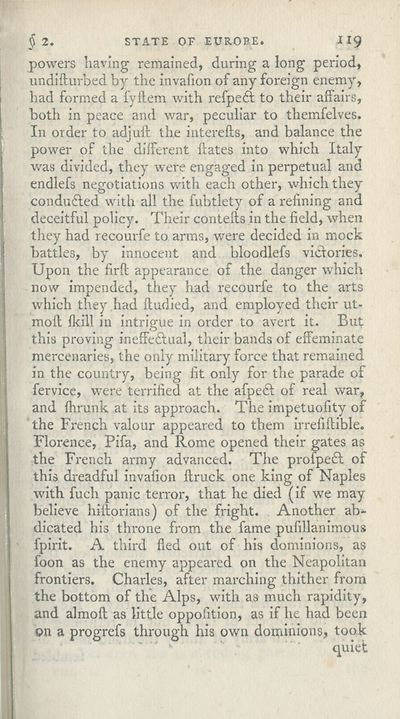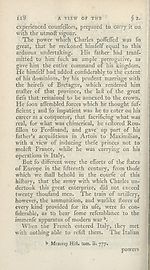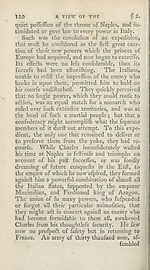Download files
Complete book:
Individual page:
Thumbnail gallery: Grid view | List view

§2. STATE OF EUROPE. I 19
powers having remained, during a long period,
undifturbed by the invafion of any foreign enemy,
had formed a fy Item with refpeft to their affairs,
both in peace and war, peculiar to themfelves.
In order to adjuft the interefts, and balance the
power of the different hates into which Italy
was divided, they were engaged in perpetual and
endlefs negotiations with each other, which they
conducted with all the fubtlety of a refining and
deceitful policy. Their contells in the field, when
they had recourfe to arms, were decided in mock
battles, by innocent and bloodlefs victories.
Upon the firft appearance of the danger which
now impended, they had recourfe to the arts
which they had fludied, and employed their ut-
moft fkill in intrigue in order to avert it. But
this proving ineffectual, their bands of effeminate
mercenaries, the only military force that remained
in the country, being fit only for the parade of
fervice, were terrified at the afpeft of real war,
and fhrunk at its approach. The impetuofity of
the French valour appeared to them irrefiflible.
Florence, Pifa, and Rome opened their gates as
the French army advanced. The profpedf of
this dreadful invafion flruck one king of Naples
with fuch panic terror, that he died (if we may
believe hiftorians) of the fright. Another ab¬
dicated his throne from the fame pufillanimous
fpirit. A third fled out of his dominions, as
foon as the enemy appeared on the Neapolitan
frontiers. Charles, after marching thither from
the bottom of the Alps, with as much rapidity,
and almofl as little oppofition, as if he had been
on a progrefs through his own dominions, took
powers having remained, during a long period,
undifturbed by the invafion of any foreign enemy,
had formed a fy Item with refpeft to their affairs,
both in peace and war, peculiar to themfelves.
In order to adjuft the interefts, and balance the
power of the different hates into which Italy
was divided, they were engaged in perpetual and
endlefs negotiations with each other, which they
conducted with all the fubtlety of a refining and
deceitful policy. Their contells in the field, when
they had recourfe to arms, were decided in mock
battles, by innocent and bloodlefs victories.
Upon the firft appearance of the danger which
now impended, they had recourfe to the arts
which they had fludied, and employed their ut-
moft fkill in intrigue in order to avert it. But
this proving ineffectual, their bands of effeminate
mercenaries, the only military force that remained
in the country, being fit only for the parade of
fervice, were terrified at the afpeft of real war,
and fhrunk at its approach. The impetuofity of
the French valour appeared to them irrefiflible.
Florence, Pifa, and Rome opened their gates as
the French army advanced. The profpedf of
this dreadful invafion flruck one king of Naples
with fuch panic terror, that he died (if we may
believe hiftorians) of the fright. Another ab¬
dicated his throne from the fame pufillanimous
fpirit. A third fled out of his dominions, as
foon as the enemy appeared on the Neapolitan
frontiers. Charles, after marching thither from
the bottom of the Alps, with as much rapidity,
and almofl as little oppofition, as if he had been
on a progrefs through his own dominions, took
Set display mode to:
![]() Universal Viewer |
Universal Viewer | ![]() Mirador |
Large image | Transcription
Mirador |
Large image | Transcription
| Antiquarian books of Scotland > Kings & rulers > History of the reign of the Emperor Charles V. > Volume 1 > (137) |
|---|
| Permanent URL | https://digital.nls.uk/109183975 |
|---|
| Description | By William Robertson. London : Cadell and Davies, 1798. |
|---|---|
| Shelfmark | ABS.1.76.13 |
| Additional NLS resources: | |
| Description | Thousands of printed books from the Antiquarian Books of Scotland collection which dates from 1641 to the 1980s. The collection consists of 14,800 books which were published in Scotland or have a Scottish connection, e.g. through the author, printer or owner. Subjects covered include sport, education, diseases, adventure, occupations, Jacobites, politics and religion. Among the 29 languages represented are English, Gaelic, Italian, French, Russian and Swedish. |
|---|

